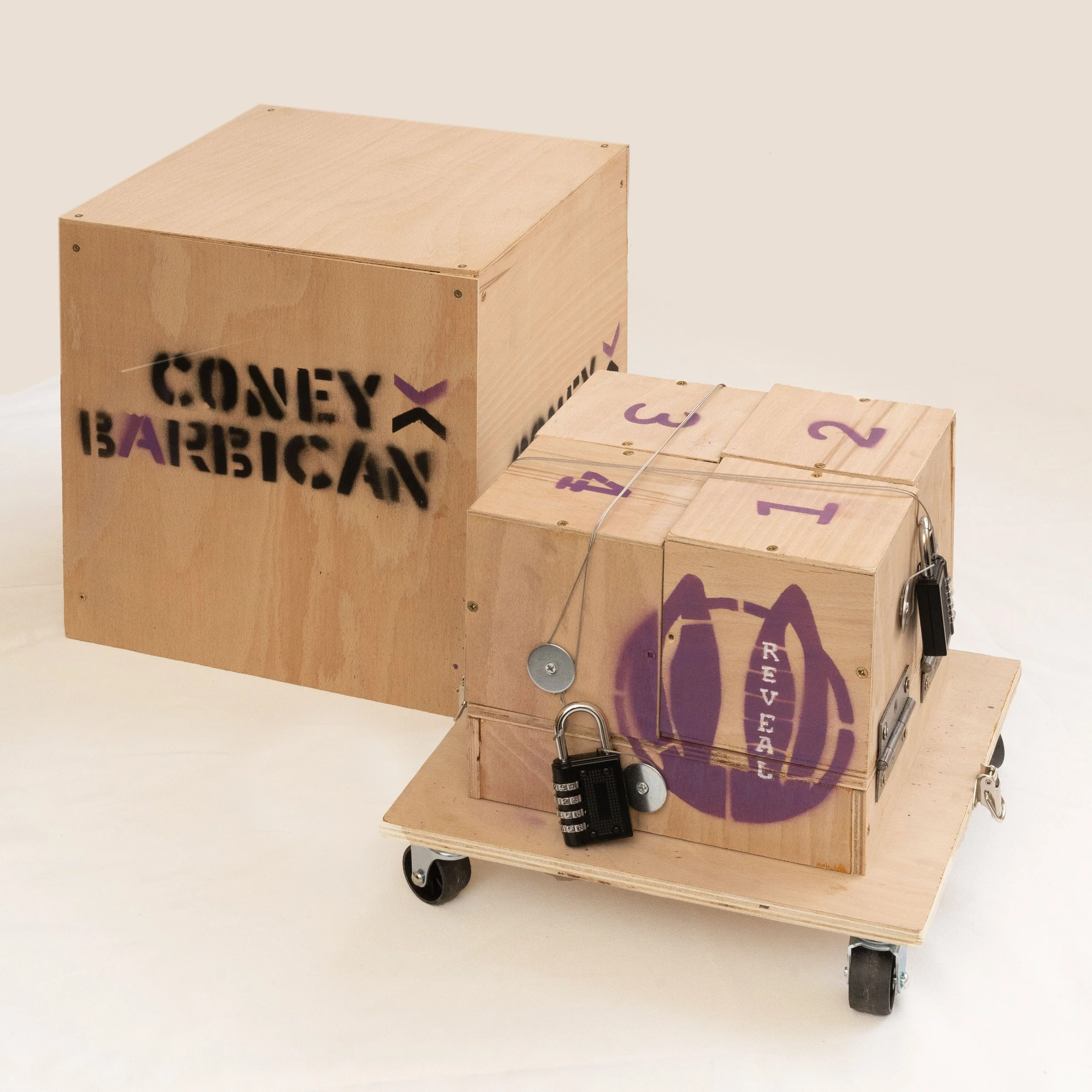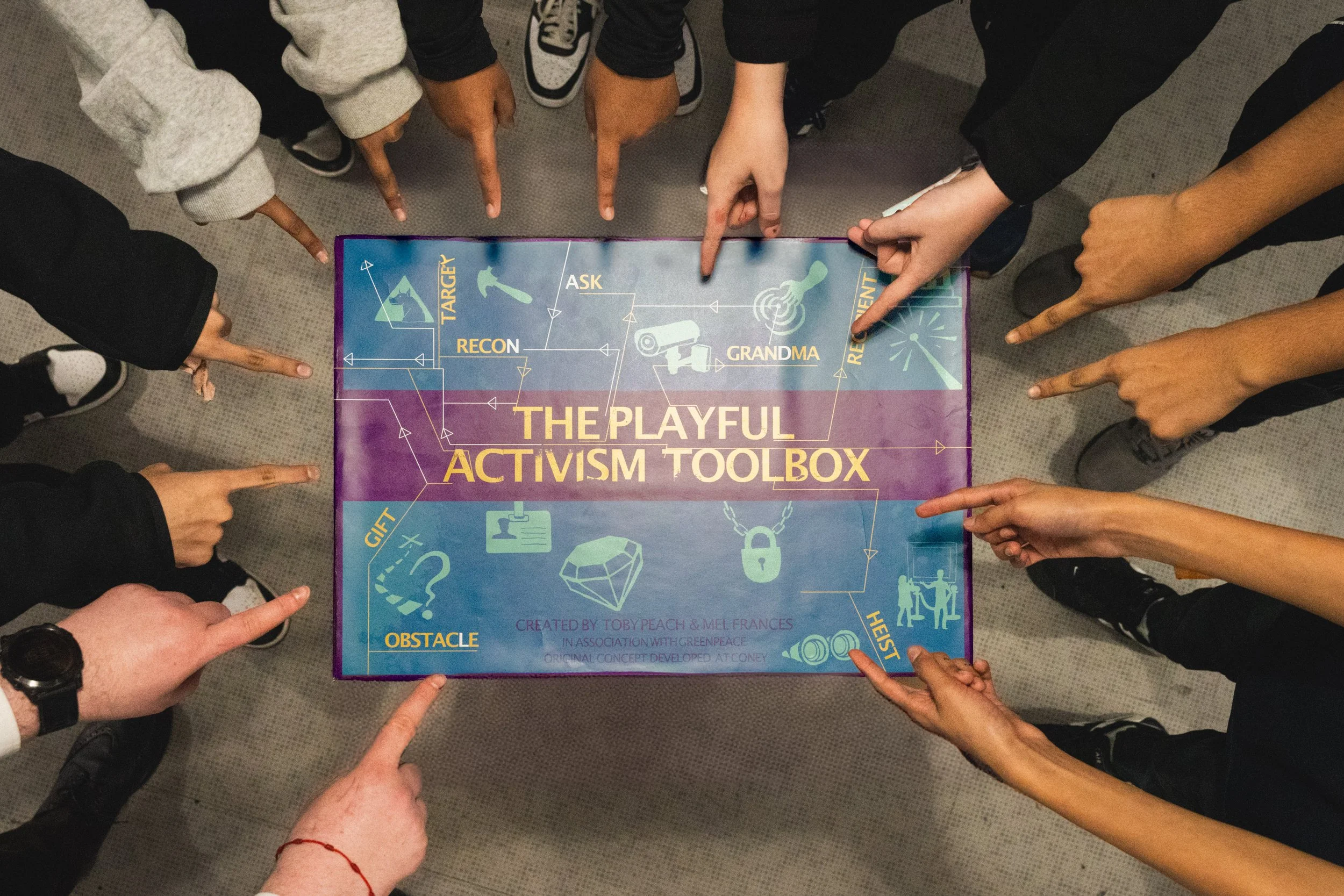A short history of Playful Activism by Toby Peach
“I can’t believe we just did that”
Minutes after finishing a creative intervention, a 10-year-old said this to sentence to me and it has stayed with ever since. For me, it is the moment Playful Activism started to form.
Codename: Violet was a project by The Young Coneys, a group of young people I was working with at Coney, where we collaborated with Greenpeace. Greenpeace invited us to make a series of games for car-industry gala dinner guests to highlight air pollution impacts and the Ditch Diesel campaign.
With a group of 10 young people we devised a series of games around cheating (VW had recently been caught cheating on their emissions tests) that the young people could comfortably play as junior junior doctors (this was part of the wider Greenpeace action).
Our group of inspiring young people took to the streets outside the gala, and playfully engaged their target audience, a group of people with power, with the conversation they wanted to be having, for the change they wanted to see in their world. This was Playful Activism in action.
A few weeks after our action, VW announced they would cut diesel cars by 2050 (not fast enough but a change) and our young people felt something - they felt like they had made a change. The weeks that followed the energy from that cohort was electrifying - though we had formed a small part of a wider campaign - our young people had sparked change.
Our model at the Young Coneys, which I led from 2018-2025, shifted to focus on listening to the changes the young people wanted to see in their world, and having playful conversations with people with the power to make those changes. We worked on a number of different approaches, and projects like The Village (a role-playing game inspired by Werewolf and Coney’s A Small Town Anywhere (that explored identity and community integration) to School For Grown Ups (an online experience for adults to learn and re-connect with education).
During this time of evolution, we moved online due to the pandemic and lockdowns. It was a time of huge change for everyone, and had a big impact on the young people we were meeting, particularly on their mental health. This was something they were concerned with, and we wanted to find ways we could playfully explore this together, and find ways to have a positive impact on others around us.
It was at this point, two projects simultaneously grew, and playful activism continued to morph.
The Barbican Box - was an arts education programme run by The Barbican, where a portable Box filled with the ingredients for making and creating original artistic work was delivered into schools. In 2021, Coney were asked to make the box and to focus on supporting the mental health & wellbeing of the young people we would meet, whilst using Coney’s unique practice, which we began calling Playful Activism.
We created a series of workshops that could be delivered through an online portal, co-delivered by a local Artist & the teacher, which would follow MIND’s Five Ways to Wellbeing and shift young people from anxiety to agency. Gifting was always a big part of Coney’s practice, inspired by the work of Tassos Stevens, and we used this mechanic as the basis of how we run our Barbican Box project - as Giving is also one of MIND’s Five Ways to Wellbeing!
The project involved students learning how to become a Playful Activist, developing their tools to support students’ mental health in secondary schools and giving young people the agency to spark change in their school spaces. These skills were used to co-devise a playful intervention, a gift, to have a positive impact on the wellbeing of their school, and with it the creation of a piece of Playful Activism. We reached 8 secondary schools, in Harlowe and Manchester, for approximately 270 young people.
Simultaneously, we co-created a version of this project with our Young Coneys. The task was to share a toolkit to help with anxiety, a concern our young people were sharing with us, through a playable experience that could land with their peers when they returned to the classrooms. Over months of online sessions, we created The Undercover CareTaker Agency (UCA), which was devised by the young people to land in primary schools in Tower Hamlets. Following a similar framework as The Barbican Box, but taking place over one day, students helped Anne, a member of UCA, to understand the mysterious Static that she was facing and find ways to counter it, through the five exercises that followed MIND’s Five Ways to Wellbeing. UCA still runs in Tower Hamlets schools, now in partnership with THEWS, as a tool to develop an emotional language. We developed a sequel in 2024 and have now reached over 5000 young people with the programme.
Both of these programmes developed our understanding of the Playful Activism practice, which became the core of our Young Coneys Training Programme (YCTP) as we returned to schools post-lockdown. The YCTP introduced how creativity can be used to influence our world, equipping young people with a playful toolkit to explore their passions and connect to their creative superpowers. During the programme, students worked with two Coney artists to create a ‘Gift’ to spark change in their school. This Gift encouraged young people to think about how their creativity can connect with someone, or a group of people, to make an impact in creating the change they want to see.
Between 2023-25, The Young Coneys Training Programme engaged 540 young people across six schools and 1801 people overall via the Gifts. Gifts ranged from a bespoke storybook for a teacher to start a reading group, manifestos of play to help students play well together and flower chains to bring colour and joy to the playground.
Our next step of development happened when we were thrilled to be asked to collaborate with Greenpeace to develop this further with a new project focused on climate activism in schools. The Playful Activism Toolbox (formerly called The Climate Agency Box) took the learning from Codename: Violet, The Young Coneys and our Barbican Box collaboration, and rooted it in climate justice. Co-led by an online platform and the teacher, students are taking through modules that introduce Playful Activism, use game mechanics to map their school system and plot an action that could modify that system to be more reflective of the world they want to see.
Also, importantly, it is about giving people the tools to cope with the crisis we face, and how to sustainably push for social change. Climate Anxiety is growing, not just in young people and one of the key factors to help people cope with that is about feeling some agency, and feeling they are part of a movement. That there is hope for the future.
The Playful Activism Toolbox evolved our understanding of the wider Playful Activism practice, and we continue to deliver the project in schools, whilst bringing the wider practice to engage young people in a multitude of ways.
But Playful Activism isn’t just for young people, we use this approach in all of our work, thinking about ways we can activate audiences to playfully engage people in power to change our world. In The Island, we worked with young people to create a participatory experience for adults to have conversations around our collective responsibility in the face of the climate crisis. Our approach offered a playable experience for adults to engage with, and then aimed to shift participants' behaviours towards how we respond to the climate era. Within this framework, we discover the importance of care & compassion within our approach. They had always been there as values, but within conversation around climate & social justice, it became clearer in focus, both in development and delivery of this project.
It has been nearly 8 years since ‘‘I can’t believe we just did that” was shared by a 10-year-old on the way back from a playful action at a car-industry gala dinner, and the Playful Activism practice has evolved immensely, as we discover new approaches to playfully converse with audiences with power to mod(ify) our future world.










